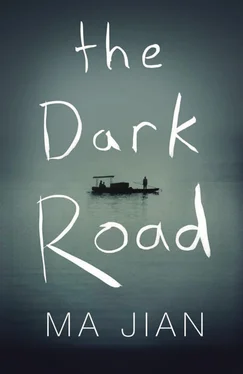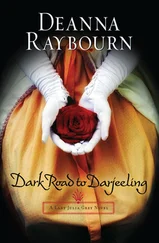Meili approaches the truck. Another woman notices her and says, ‘Are you looking for a scavenging job?’
‘What’s the daily wage?’ Meili asks, trying to sound casual.
‘Fifteen yuan, with free lodging and lunch. If you’re interested, go up there and speak to Mr Deng.’ The woman points to a hill behind them that has flimsy shacks crammed onto the lower slopes and black crows hovering above the peak. The prospect of free food and shelter appeals to Meili. She decides to stay for a few days until she’s earned enough money to pay for her journey back to Guai Village.
The workers have built the shacks with wooden boards and plastic sheeting below a village that was torn down to make way for the landfill site. The families live and work inside them, dismantling rubbish they retrieve from the site and sorting it into piles of glass, paper, plastic and metal, which are then taken to be weighed at the warehouse. Battered cassette recorders, motorbikes, sofa cushions and other objects the warehouse rejected lie stacked outside each doorway. Shelters occupied by families with young children are surrounded by broken prams and dirty plastic toys. Washing lines have been strung between the roofs of the shacks. The grey bras and tights flapping from them look pure white compared to the filth below. Along the path, pigs nozzle heaps of refuse, searching for scraps to eat, while ducks wade through waste-water streams, ruffling their wet and grimy feathers. On this hillside, the decaying and the living emit the same morbid stench.
On a bright morning three days later, Meili puts on her canvas gloves, sits down on a tyre and stares at the mass of tattered shoes spread before her. With her experience of gutting fish for a living, she managed to secure the job of dismantling shoes, which allows her to sit while she works. To dismantle boots, she has to slide her knife up the leg, rip it off, pull out the inner sole, extract each nail, smash off the heel, remove the rubber outsole and place the leather or synthetic upper into the correct pile. All leather, whether from shoes, gloves or sofas, is shredded and boiled to produce the protein which is added to counterfeit milk formula. Sports shoes are simpler to take apart, as the soles can be removed with one slit of the knife. When Meili finds a shoe she considers too pretty to destroy, she puts it aside in the hope that its pair might turn up. Yesterday, she thought the miracle had happened when she spotted a purple mid-heel T-strap sandal, identical to the one in her hand, lying on top of the heap. If only it was a right shoe, and not another left, it would be a perfect match.
Liu Di, the woman in the shack next to hers, is in charge of sorting through glass bottles. She gave Meili the plasters that now criss-cross her hands. Liu Di has four out-of-quota children. Right now, the three eldest are jumping about on a pile of plastic bags and the six-month-old baby is sleeping in a fly-encrusted crate, wedged between empty Coca-Cola bottles and ceramic wine flasks.
‘Get down, you brats!’ Liu Di shouts. She smashes another bottle onto the ground and shards of broken glass fly into the sunlight.
‘Be careful, children, he might bite you — agh, I’ve always been afraid of dogs!’ Meili says, pointing to the mangy grey dog that roams the landfill site like a piece of walking rubbish. Three metal springs are hooked to his frayed waistcoat. Since his owner disappeared last year, he’s become melancholy and unhinged, and no one dares go near him.
‘How come she has yellow hair?’ Meili asks, glancing at the baby’s blonde head nestled in the crate. She remembers the force with which Waterborn sucked her nipples and feels sick with longing. The baby’s head is huge, and her cheeks are so swollen that her features have become squashed together. Her hands and feet look tiny in comparison. The day she was born, her father found a watch on the landfill site and so named her ‘Little Watch’.
‘Her hair was jet black when she came out of me,’ Liu Di laughs. ‘But after my milk ran dry, I put her on Three Deers infant formula, and her hair turned yellow overnight.’ Liu Di is wearing three pairs of nylon tights to keep her legs warm. She’s leaning against the pink vinyl armchair in which she eats her meals and takes afternoon naps.
The pile of leather scraps beside Meili is now high enough to block the wind, but not the stench that wafts up from the landfill site. When her shelter’s walls flap, she can glimpse the cold light bouncing from a pile of sky-blue plastic canisters further up the path.
A week passes. The purple bruising around her neck has slowly faded, and she has tried to push memories of the rape out of her mind. But this morning, she was shaken out of her numbed state when she saw, lying on a heap of rubbish, the corpse of a tiny baby. She recoiled in horror, and went to sit under a tree far away. Her longing for Waterborn, and rage against Kongzi for getting rid of her, surged to the surface. She made up her mind to work here for another week then go back to Guai Village, making sure not to be caught on the way. Liu Di’s husband told her that the only way to avoid arrest is to dress like a city resident. Meili feels relatively safe on the landfill site. Although all the workers are illegal migrant peasants, no government official would be willing to brave the stench to come and check their documents. Meili can work in peace, and in her free moments, flick through magazines she finds on the site to study how women in the cities dress. Yesterday, she found a designer raincoat with a missing pocket which she’s swapped with a fellow worker for an imitation jade bracelet and a compact with a patch of foundation powder remaining and a mirror on the inside lid. She’s also come across handbags that were probably binned by thieves after they’d extracted the wallets. Many of them are brand new, and contain keys, combs, condoms, pills, packets of tissues and leather address books.
‘It can’t be easy bringing up four children, Liu Di,’ Meili says, wiping the flies from her mouth. She put on some lipstick this morning which she found in a handbag, and flies have been swarming around her mouth ever since. Liu Di told her that the lipstick is probably flavoured with honey.
‘It’s just a few more mouths to feed, that’s all,’ Liu Di replies. ‘That beef and bitter gourd they gave us yesterday was delicious, wasn’t it?’ When the boxed lunches are handed out at noon, Liu Di usually gives hers to her children, but yesterday she couldn’t resist gobbling it all up herself. She could never afford to eat meat back in her village, but becoming a family planning fugitive has widened her horizons. She has tasted hamburgers and Coca-Cola. Whenever she finds a bottle of Coke that is not quite empty, she sniffs it, and if it doesn’t smell too sour, keeps it aside for her children to drink later.
‘I wish I could have a shower and wash this stench from my skin,’ Meili sighs. She jabs her knife into the seam of a leather brogue, drags it around the base, pulls off the leather upper and tears out the insole which still bears the imprint of a man’s five toes.
‘Why didn’t you go with us to Sunlight Bathhouse the other day, then? It’s only two kilometres away.’
‘I didn’t want to walk that far — I was afraid police might catch me.’ Inside the bag by Meili’s feet are four pairs of shoes which she hopes will fit Kongzi and Nannan.
‘If you spray some cologne into a bowl of water and wash yourself with it, you’ll smell as though you’ve used soap. But I warn you, the nicer you smell, the more flies you’ll attract.’ Liu Di always laughs when she finishes speaking. The only time she didn’t was when she told Meili that her third baby was killed by family planning officers a few seconds after it was born.
Читать дальше












